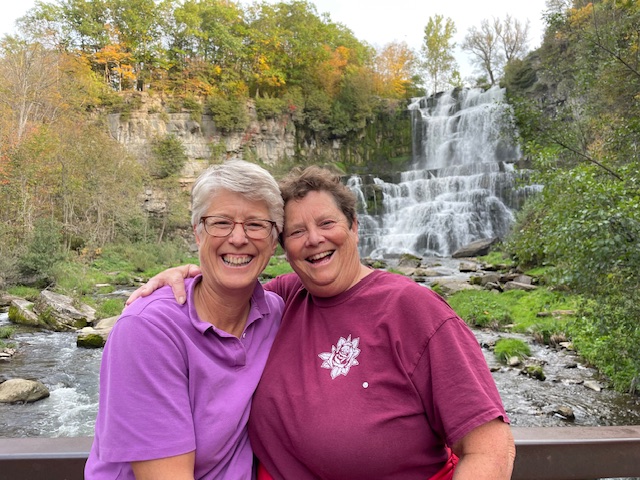Early detection of breast cancer: Barb’s story

Getting diagnosed with breast cancer was not in my retirement plans. Yet here I was, two months into retirement, going to appointment after appointment to prepare for surgery and post-op radiation to treat my recent breast cancer diagnosis.
The malignancy was found during my annual mammogram—so I am one of the “lucky” ones whose cancer was caught early and thus had effective treatment options available to me. I began getting mammograms when I turned forty—the current age recommended to begin screening for breast cancer if you are at average risk and have no personal or family history. In previous years, I had a few biopsies of questionable masses, but until now, all of them were benign.
I knew right away that this mammogram was not like the others before it—when the radiologist came in and explained his findings to me, instead of the usual “most masses are benign” discussion, he said he suspected the mass was cancerous, but that it was “subtle, small, early and very treatable.” I had a needle biopsy that confirmed the cells were cancerous, and my journey to treat the cancer began.
Learning that you have cancer is like feeling the earth beneath your feet shift. I have no history of breast cancer in my family and never thought breast cancer could happen to me. After the diagnosis, I was bewildered and scared—I had never faced a serious health condition before and always considered myself to be healthy. Now, I was searching for the oncology department at my local hospital.
I can tell you that while my cancer was diagnosed as Stage 1 and considered very treatable, that does not mean that living through the course of treatment was easy. I had the immense gift of my wonderfully supportive wife, Sarah, who was by my side every step of the way. From recovering from lumpectomy surgery (wrapping my post-surgery breasts required over 30 linear feet of bandages—we got dizzy twirling around to get them properly wrapped!), to applying salve to help me heal from the burns caused by the radiation, I would have been lost without her.
It has been a year since my diagnosis, and I have healed from the surgery and radiation. I struggle a bit with the estrogen-blocking drug that I will be taking for the next five years. Fatigue and body aches are more prevalent, although both are becoming more tolerable. I go to the gym three times a week to regain my upper body strength and mobility that was lost due to the surgery and the estrogen-blocking drug.
Recently, I had my first follow up mammogram. So far, all seems on track for a complete recovery, but cancer now occupies part of my self-identity. I have joined a local breast cancer survivors’ support group. Participating in the group and feeling the love and support of other women who have faced breast cancer has helped me process my cancer journey.
As an older lesbian, I know many lesbian friends who have had breast cancer. I note ruefully that lesbian couples are likely to be more impacted by breast cancer than heterosexual couples. If one out of eight women will be diagnosed with breast cancer over their lifetimes, then it stands to reason that one out of every four lesbian couples will be in “cancer world” sometime in their life. A sobering statistic and one that should give the LBGTQ+ community pause—and strengthen the messaging that early detection matters—and saves lives.
What have I learned after this difficult year? First, I did not realize that most women who have breast cancer do not have a family history of the disease. I thought that because there was no breast cancer in my family, my risk of breast cancer was low. But as it turns out, only 5-10% of cancers are hereditary, and most people who get cancer do not have a family history of the disease. Second, early detection of breast cancer is key to improving outcomes. My cancer was found during a routine mammogram. I have no doubt that finding the cancer early was key to surviving breast cancer. And finally, when you are diagnosed, you become a member of a “club” that no one wants to be a part of. Yet, the support I have received from other breast cancer survivors has been amazing. Friends and colleagues reached out to me and gave me support, advice and comfort during a trying time. Now, it’s my turn to support other women through their cancer treatments, and to remind friends—and you—to keep up with routine breast cancer screening.